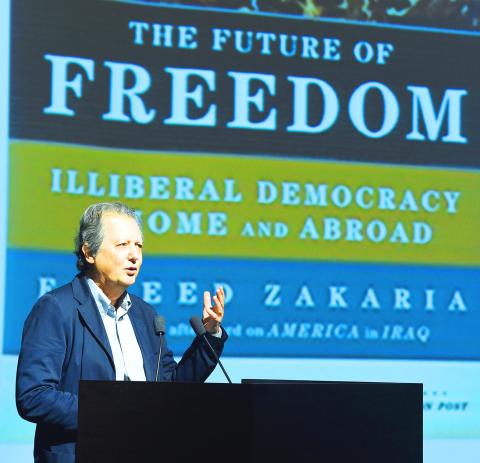The spread of illiberal democracy across the globe coincides with the rise of populist tendencies in many democratic countries, and countries like Taiwan should maintain a vibrant democratic culture, free press and welfare system to resist it, Reporters Without Borders (RSF) chairman Pierre Haski said yesterday.
Haski made the remarks at a forum in Taipei, where he said that there are two kinds of democracies: constitutional democracy and illiberal democracy.
The former ensures individual rights, the rule of law and an independent judiciary, while the latter exhibits patterns of repression while maintaining the appearance of democracy, Haski said.

Photo: Liao Chen-huei, Taipei Times
An apparent rise of illiberal democracy can be observed in the US, France, Hungary, Poland, Turkey, Russia and many other countries, he said.
The “cult of the strongman,” the manipulation of nationalist myth to include a glorious past and xenophobia can be seen across those countries, Haski said.
US President Donald Trump’s “make America great again” slogan or Turkish President Recep Tayyip Erdogan’s boasting about a strong Turkish empire are examples of this, he said.
The Cold War divide between countries and ideologies has been replaced by a new divide in society, with more and more people becoming disenchanted with existing democracy and market systems, Haski said, adding that this was manifest in Brexit, Trump’s victory and the popularity of France’s far-right leader Marine le Pen.
Meanwhile, “China is not in the realm of illiberal democracy. It is not liberal or a democracy at all,” Haski said.
China’s immediate problem is not its undemocratic system, but the nonexistence of the rule of law, he said, citing corruption cases in which village mayors monopolized local land sales and embezzled village funds, but villagers could not obtain help from the judiciary, the media or international organizations.
When asked whether democracy is applicable to China or Asia, with former Singapore prime minister Lee Kuan Yew (李光耀) cited as an example of someone who rejected the Western idea of democracy, Haski said he respects people’s freedom to choose political systems, but the problem is people are not really given a choice at all.
Taiwan has a vibrant democratic culture that could resist illiberal democracy, Haski said.
“Taiwan has made incredible progress in democracy in the sense that it has seen two changes of government in power,” he said. “That’s a lot of democracy happening.”
“The purpose of illiberal democracy is to prevent [those changes].” Haski said. “[Illiberal democracy] has the appearance of democracy but you don’t change the party in power. Taiwan has managed to reach that [democratic] state without too much pain.”
Taiwan is ranked a leading country in press freedom, he said, and although its mainstream media might be controlled by large businesses, a plurality of opinions can be observed on online media, creating a vibrant media culture.

US President Donald Trump said "it’s up to" Chinese President Xi Jinping (習近平) what China does on Taiwan, but that he would be "very unhappy" with a change in the "status quo," the New York Times said in an interview published yesterday. Xi "considers it to be a part of China, and that’s up to him what he’s going to be doing," Trump told the newspaper on Wednesday. "But I’ve expressed to him that I would be very unhappy if he did that, and I don’t think he’ll do that," he added. "I hope he doesn’t do that." Trump made the comments in

NOT AN OPENING: Trump’s violation of international law does not affect China’s consideration in attacking Taiwan; Beijing lacks capability, not precedent, an official said Taiwanese officials see the US’ capture of the president of Venezuela as a powerful deterrent to Beijing’s aggression and a timely reminder of the US’ ability to defeat militaries equipped with Chinese-made weapons. The strikes that toppled Venezuelan President Nicolas Maduro signaled to authoritarian leaders, including Chinese President Xi Jinping (習近平), US President Donald Trump’s willingness to use military might for international affairs core to US interests, one senior official in Taipei’s security circle said. That reassured Taiwan, the person said. Taipei has also dismissed the idea that Trump’s apparent violation of international law could embolden Beijing, said the official, who was not

A cold surge advisory was today issued for 18 cities and counties across Taiwan, with temperatures of below 10°C forecast during the day and into tonight, the Central Weather Administration (CWA) said. New Taipei City, Taipei, Taoyuan and Hsinchu, Miaoli and Yilan counties are expected to experience sustained temperatures of 10°C or lower, the CWA said. Temperatures are likely to temporarily drop below 10°C in most other areas, except Taitung, Pingtung, Penghu and Lienchiang (Matsu) counties, CWA data showed. The cold weather is being caused by a strong continental cold air mass, combined with radiative cooling, a process in which heat escapes from

Snow this morning fell on Alishan for the first time in seven years, as a strong continental cold air mass sent temperatures plunging across Taiwan, the Central Weather Administration (CWA) said. The Alishan weather station, located at an elevation of about 2,200m in central Taiwan, recorded snowfall from 8:55am to 9:15am, when the temperature dropped to about 1°C, the CWA said. With increased moisture and low temperatures in the high-altitude Alishan area, the conditions were favorable for snow, CWA forecaster Tsai Yi-chi (蔡伊其) said. The last time snow fell at the Alishan weather station was on Jan. 10, 2018, while graupel fell there